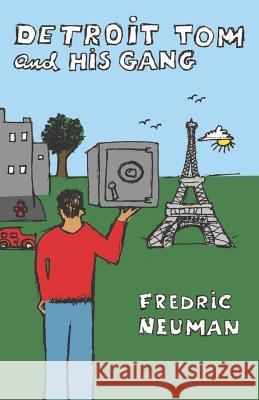Detroit Tom and His Gang » książka
Detroit Tom and His Gang
ISBN-13: 9781466254541 / Angielski / Miękka / 2011 / 198 str.
Detroit Tom was the biggest kid on his block, and probably the next block too, and strong, super-strong, maybe even stronger than that. He was "really" strong. But dumb. Detroit Tom ranked 98 on the dumb scale, which may not be good enough to become a criminal mastermind--which was Tom's ambition. But, then again, "Big Louie," Tom's role model was a top-flight criminal, when he wasn't in jail, and he reached pretty high-up on the dumb scale too. In these two adventures, Detroit Tom and the guys from his gang: "Ratsie" Ratowitz, who was good at plotting and conniving, "Speedy" Arnold, who has some sort of sleeping disorder and falls asleep during burglaries, and "Fat Bernie," whose favorite thing to steal is food, set out to commit the two heists of the century. Aided by "Smelly Beatrice," of course. In "Detroit Tom and the Famous Fruit Stand Robbery," Detroit Tom and his gang get by the moat and the armed guards in an attempt to steal the secret fruit formula. In "Detroit Tom and the Saint What's- His- Name Festival," Detroit Tom scales the model of the Eiffel Tower to foil a robbery being committed by "Even Bigger Louie" and his gang. And then the bugs come. Other characters, including "Horrendous, the Dog,""Charlie the Nose," and"Filet of Soul," disturb the otherwise idyllic and rainbow-colored setting of "bug city." There are earthquakes, and fires and people running around in different directions. The dead-pan narrative adds to the fun. At the center of these hilarious stories, however, is Detroit Tom and his mishaps and misadventures in his star-crossed attempts to become a master criminal when he only comes up to two and a half on the brain scale. " Detroit Tom and His Gang" is written for eight-year olds and up. And way up. It is a witty take-off on young adult novels and their account of the troubled aspirations of kids and their attempts to bond with each other. Still, because Tom is not as bad as he would like to be, the many morals of theses stories, all spelled out explicitly, include "Crime does not pay." or at least "Crime does not pay very much."
Zawartość książki może nie spełniać oczekiwań – reklamacje nie obejmują treści, która mogła nie być redakcyjnie ani merytorycznie opracowana.











